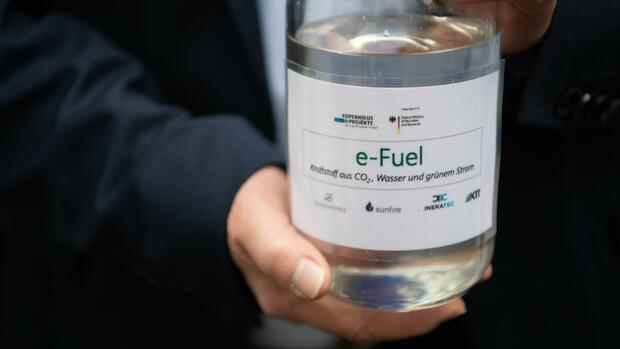Brussels From 2035, cars that produce CO2 when driving will no longer be allowed to be sold in the EU. At least that is what the EU Commission’s legislative proposal, which will be discussed in the coming months, provides.
EU Transport Commissioner Adina Vălean has now made it clear that it doesn’t just have to be about electric cars. She is closely monitoring the discussion about e-fuels in Germany, she said at the auto summit of the Handelsblatt. She is also looking to the Netherlands, where the trend is more towards hydrogen.
E-fuels are synthetically produced fuels. A lot of electricity is needed for their production, and the conversion process is less efficient than charging a battery. That is why they are seen by many as inferior when it comes to making cars and light commercial vehicles climate-neutral.
But e-fuels also have advantages. “The infrastructure is already there,” said Vălean. “Having liquid fuel for the road would be absolutely great.” What they mean is that refineries and gas stations could continue to be used. Hydrogen does not have this advantage. For him, new high-pressure tanks and tank systems would have to be set up at the gas stations.
Top jobs of the day
Find the best jobs now and
be notified by email.
E-fuels are also an important source of hope for the automotive industry because many suppliers produce parts that are needed for combustion engines but not for electric cars: engine blocks, cylinders, transmissions, exhaust gas cleaning and much more.
EU Commission President Timmermans is more skeptical about e-fuels
If e-fuels fail to catch on in cars and light commercial vehicles, these companies will only have the truck parts market, where e-fuels are likely to find use. They are also intended to be used in aircraft and ships.
Vălean attaches great importance to being open to technology. There is movement in the market and it is not yet possible to say which technology will be most successful. “But I am happy about all the possibilities that are there.”
“The infrastructure is already there,” said Vălean at the Handelsblatt Autogipfel with a view to e-fuels.
With her optimistic remarks, Vălean sets himself apart from Commission Vice-President Frans Timmermans, who is extremely skeptical on the subject. “Some in the auto industry claim that internal combustion engine cars can also be emission-free. I think that’s quite a challenge, to put it very mildly, ”he told the Handelsblatt in the summer.
The emerging traffic light coalition in Germany wants to keep the path to e-fuels open. According to their exploratory paper, the parties want to work to ensure that “demonstrably only vehicles that can be refueled with e-fuels” can continue to be registered after 2035.
Vălean: Politics should follow market trends
At the auto summit, Vălean also pointed out the risk that the e-fuel sectors could “cannibalize” – that is, that there would not be enough climate-neutral fuel available for air traffic if it were used in large quantities by cars. The market should play a role in the decision. Politicians have to follow the trends in the market.
Proponents of e-fuels fear, however, that not enough will be invested if there are not enough incentives to do so. In this way, e-fuels could be exempted from energy tax, demands the lobby organization E-Fuel-Alliance.
The first plants are currently being planned to produce the substances in the relevant sizes. It remains to be seen whether one day they will be cheap enough to be burned en masse in cars.
However, there are also bottlenecks in the transport of electricity. Vălean said that more and more electricity will be needed as a result of the transformation. The transmission networks would have to be expanded accordingly.
Public charging points, on the other hand, are not the biggest problem. To this end, the Commission proposed binding expansion targets that the Member States would have to meet. Many states have already started the Corona reconstruction programs, although the goals are still a long way from being in force.
In order to accelerate the switch to climate-neutral cars, the EU is also relying on emissions trading that includes gasoline and diesel as well as heating oil and gas. Such a trade already exists in Germany.
The planned EU law is not in Vălean’s responsibility, but she spoke out in favor of effective corrective measures should the prices for emissions certificates rise too sharply. This would particularly affect motorists in their home country Romania, where incomes are lower than in hardly any other EU country.
More: E-fuels from Chile: How Porsche wants to save the 911
